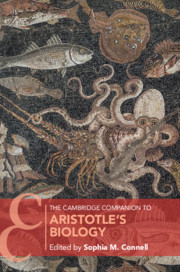Book contents
- The Cambridge Companion to Aristotle’s Biology
- OTHER VOLUMES IN THE SERIES OF CAMBRIDGE COMPANIONS
- The Cambridge Companion to Aristotle’s Biology
- Copyright page
- Contents
- Figures
- Contributors
- Abbreviations
- Introduction
- Chapter 1 Biology and Theology in Aristotle’s Theoretical and Practical Sciences
- Chapter 2 The Presocratics, Plato, and Aristotle’s Biology
- Chapter 3 Aristotle’s Biology and Early Medicine
- Chapter 4 Empiricism and Hearsay in Aristotle’s Zoological Collection of Facts
- Chapter 5 Parts of Animals Book 1 on Methods of Inquiry
- Chapter 6 Teleological Perspectives in Aristotle’s Biology
- Chapter 7 Aristotle’s Biological Metaphysics
- Chapter 8 Life-Cycles and the Actions of Nutritive Soul in Aristotle
- Chapter 9 Aristotle on Animal Generation and Hereditary Resemblance
- Chapter 10 The Science of Perception in Aristotle
- Chapter 11 Aristotle’s Theory of Animal Agency and the Problem of Self-Motion
- Chapter 12 Animal Cognition in Aristotle
- Chapter 13 Elements of Biology in Aristotle’s Political Science
- Chapter 14 The Early Reception of Aristotle’s Biology
- Chapter 15 The Reception of Aristotle’s Biology in Late Antiquity and Beyond
- Chapter 16 Aristotelian Teleology and Philosophy of Biology in the Darwinian Era
- Chapter 17 Aristotle and Contemporary Biology
- Afterword: Philosophical Issues in Aristotle’s Biology – Its Coming-to-Be and Its Being
- Bibliography
- General Index
- Index Locorum
- OTHER VOLUMES IN THE SERIES OF CAMBRIDGE COMPANIONS
- References
Chapter 13 - Elements of Biology in Aristotle’s Political Science
Published online by Cambridge University Press: 14 May 2021
- The Cambridge Companion to Aristotle’s Biology
- OTHER VOLUMES IN THE SERIES OF CAMBRIDGE COMPANIONS
- The Cambridge Companion to Aristotle’s Biology
- Copyright page
- Contents
- Figures
- Contributors
- Abbreviations
- Introduction
- Chapter 1 Biology and Theology in Aristotle’s Theoretical and Practical Sciences
- Chapter 2 The Presocratics, Plato, and Aristotle’s Biology
- Chapter 3 Aristotle’s Biology and Early Medicine
- Chapter 4 Empiricism and Hearsay in Aristotle’s Zoological Collection of Facts
- Chapter 5 Parts of Animals Book 1 on Methods of Inquiry
- Chapter 6 Teleological Perspectives in Aristotle’s Biology
- Chapter 7 Aristotle’s Biological Metaphysics
- Chapter 8 Life-Cycles and the Actions of Nutritive Soul in Aristotle
- Chapter 9 Aristotle on Animal Generation and Hereditary Resemblance
- Chapter 10 The Science of Perception in Aristotle
- Chapter 11 Aristotle’s Theory of Animal Agency and the Problem of Self-Motion
- Chapter 12 Animal Cognition in Aristotle
- Chapter 13 Elements of Biology in Aristotle’s Political Science
- Chapter 14 The Early Reception of Aristotle’s Biology
- Chapter 15 The Reception of Aristotle’s Biology in Late Antiquity and Beyond
- Chapter 16 Aristotelian Teleology and Philosophy of Biology in the Darwinian Era
- Chapter 17 Aristotle and Contemporary Biology
- Afterword: Philosophical Issues in Aristotle’s Biology – Its Coming-to-Be and Its Being
- Bibliography
- General Index
- Index Locorum
- OTHER VOLUMES IN THE SERIES OF CAMBRIDGE COMPANIONS
- References
Summary
Aristotle is a political scientist and a student of biology. Political science, in his view, is concerned with the human good and thus it includes the study of ethics. He approaches many subjects from the perspective of both political science and biology: the virtues, the function of humans, and the political nature of humans. In light of the overlap between the two disciplines, I look at whether or not Aristotle’s views in biology influence or explain some of his theses in political science. I show that we should not seek a unified answer to this question, for the relationship between the two disciplines varies depending on the topic. In some cases, for example the nature of the human function, the biological background is likely to be endorsed as one of the presuppositions of the ethical enquiry. In other cases, for example the study of social hierarchies, even though the ethical works and the biological works come to similar conclusions, it is hard to establish that the biological approach is intended to provide support to the ethico-political approach. In conclusion, I show that Aristotle’s political science and his biology are in conflict at least in two important cases: his account of justice towards nonhuman animals and his exhortation to contemplate.
- Type
- Chapter
- Information
- The Cambridge Companion to Aristotle's Biology , pp. 211 - 227Publisher: Cambridge University PressPrint publication year: 2021
References
Guide to Further Reading
- 2
- Cited by

